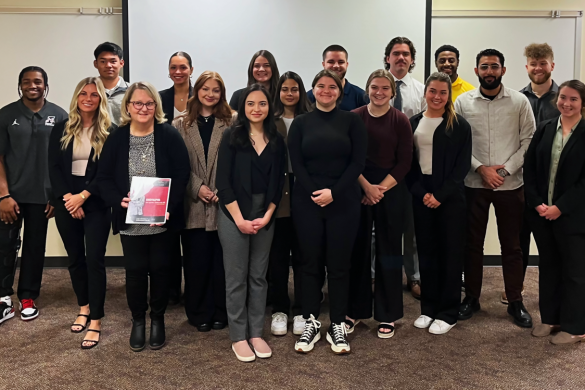Every semester students have the opportunity to read and judge various prose and poetry submissions that incorporate a particular theme that the students choose. Last year, Etchings Press students chose the theme of social justice. Students currently enrolled in ENGL 479 are tasked with reading a plethora of poetry and prose collections in order to narrow the submissions to one poetry winner and one prose winner.
Phillip B. Williams was selected by ENGL 479 Etchings Press students as the 2017 Whirling Prize winner in Poetry for his collection of poems “Thief in the Interior.”
Senior literary studies and creative writing double major Spencer Martin said that the process of selecting the Etching Press Whirling Prize winners is broken down in stages.
“The process for selecting the winners starts with a deadline. Early in the semester, we are given a deadline for writers or agents to send in books for us [Etchings Press] to judge. So, after we have our submissions, they are split into two groups: prose and poetry. Then we begin reading,” Martin said. “Over the course of the semester we [Etchings Press students] basically switch the books [submissions] with each other and meet together once the submissions have been read and we discuss our top picks. And from that point, we narrow our picks down to our two winners.”
According to the University of Indianapolis’ website, submissions for the Whirling Prize have a fee of $20 per entry. The winners are granted $500, the opportunity to read their work as part of the Kellogg Writers Series and can sell their published work at the University of Indianapolis’ bookstore.
The winners came to UIndy on April 18 to read their work and accept their award. They were welcomed by the Kelloggs Writers Series and the Etchings Press. The 2018 Whirling Prize winners were Alexander Weinstein and Phillip B. William.
Short story author Alexander Weinstein received the 2017 Whirling Prize in Prose for his collection “Children of the New World,” about future technological advances.
Assistant Professor of English and Etchings Press advisor Liz Whiteacre began the event by thanking the students involved in selecting the 2017 winners as well as those who made the event possible.
“Our student judges did an amazing job with responding to writers questions, entering books into databases, reading a ton of books and really thoughtfully thinking about who UIndy should honor for this prestigious prize,” Whiteacre said.
One of the student judges, junior professional writing and finance double major Kara Wagoner, introduced short story author and Whirling Prize winner Alexander Weinstein, who read from his short story collection, “Children of the New World.”
“His debut collection uses the lens of science fiction to hypothesize technological advances may shape the future,” Wagoner said. “By presenting each short story and consequently each new world to the reader through the eyes of the narrator—he achieves his most impressive feat—rationalizing farfetched and sometimes immoral uses of technology. ‘Children of the New World’ demands we [society] take a step back from our dependence on technology and evaluate the extent to which we allow to influence our decisions both personal and professional thus we lose touch of reality.”
After Weinstein’s reading, another student judge, senior literary studies and creative writing major Jimmy Nelligan, introduced poet and Whirling Prize winner Phillip B. Williams.
“Williams’ collection, ‘Thief in the Interior’ focuses on the social justice issue surrounding African American communities, queer community and the intersection of them, too,” Nelligan said. “He poses the struggles these communities in many unique poetic techniques to give the reader richness behind the meaning. Through his bold use of language and unforgiving imagery, this collection transcends its readers to a new realm of poetic narration.”
Junior earth space science major Sarah Hoffmeier said she noticed the vocal tones both authors exhibited. She said that the way they pronounced and inflected their collection helps make readers see beyond the linear words.
“Hearing them read their work, compared to the way I read it, brought more meaning to the poem,” Hoffmeier said. “It gave their work more depth and provided a different viewpoint to the story that I probably would not have experienced had I not attended the reading.”







